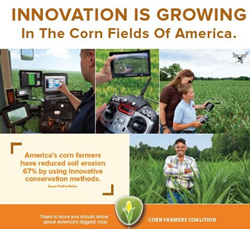 Riders on D.C.’s Metro have been looking at the faces of farmers for seven summers. This summer they will likely view fragrance ads and real estate commercials, as the Washington Metropolitan Area Transportation Authority rejected the Corn Farmers Coalition‘s annual campaign. Ads already in place were recently removed following the decision of the board to disallow all “issues and advocacy” campaigns throughout the system. The decision is the result of a controversial political group that sought to place ads featuring a cartoon of Muhamad, an image that has been linked to a death in Texas.
Riders on D.C.’s Metro have been looking at the faces of farmers for seven summers. This summer they will likely view fragrance ads and real estate commercials, as the Washington Metropolitan Area Transportation Authority rejected the Corn Farmers Coalition‘s annual campaign. Ads already in place were recently removed following the decision of the board to disallow all “issues and advocacy” campaigns throughout the system. The decision is the result of a controversial political group that sought to place ads featuring a cartoon of Muhamad, an image that has been linked to a death in Texas.
“This is a disappointing development to say the least,” said Dan Nerud, a farmer from Dorchester, Nebraska and director on the Nebraska Corn Growers Association. “We think it is important to educate legislators and other thought leaders in our nation’s capital about the men and women who grow corn. The Corn Farmers Coalition simply highlights the constantly improving practices and technology that have allowed us to become the most productive farmers in the world, and to do so while making major environmental improvements.”
While the diverse ad campaign is moving forward, with digital and traditional print ads in publications like the Washington Post, Wall Street Journal, Politico, The Hill and Roll Call, putting the large-scale ads in heavily trafficked Metro stations around Capitol Hill has become the most recognized element of the campaign. Corn Farmers Coalition is investigating several advertising options to address the gap left by the Metro decision including placing television ads during the Sunday morning talk shows in Washington.
“This direct outreach puts a face on today’s family farmers and raises overall awareness with legislators, leaders of governmental agencies, think tanks, lobbyists and environmental groups,” said Dennis Maple, president of Indiana Corn Marketing Council and farmer from Greentown, Ind. “Awareness of the innovation, technology, and generations of accumulated knowledge represented by family farmers should be a part of our national dialogue about agriculture and food.”

